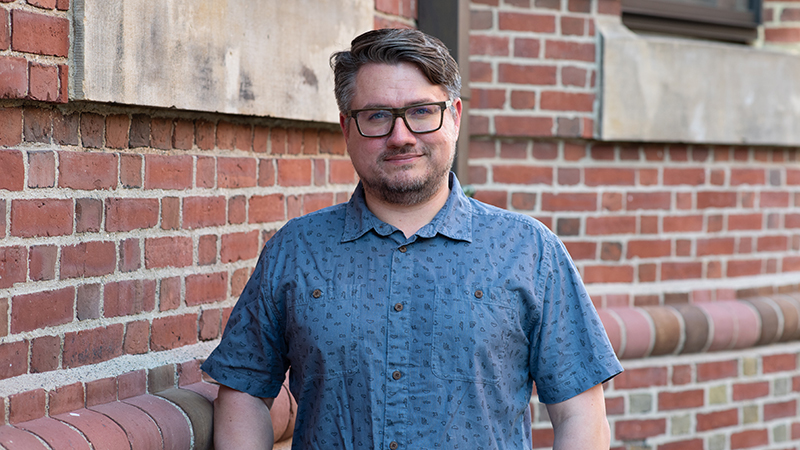People affected by psychiatric or neurological conditions, such as Major Depressive Disorder or Parkinson’s Disease, often experience severely reduced motivation to exert physical or mental effort toward a desired goal, which is thought to result from altered cost-benefit decision-making processes. In my work in the lab of Diego A. Pizzagalli, I aim to understand how exposure to acute and chronic stress or the presence of early-life adversity—factors often associated with the development or worsening of symptoms of psychopathology—impact the neural and cognitive mechanisms that guide motivated behavior in humans.
Photo by Celia Muto
What are the big questions driving your research?
Motivational impairments can severely impact a person’s day-to-day functioning and their quality of life, to the point that it becomes difficult to even get out of bed. I am curious about the biological and behavioral processes that underly people’s willingness to engage in physical or mentally challenging activities and how changes in these processes may cause clinically relevant levels of amotivation that characterize a wide range of psychopathologies. However, those mechanisms are complex and cannot be linked to a single brain area, neurotransmitter system, or cognitive process alone. Moreover, a person’s motivation is not stable and can change over time or based on external influences, for example when people experience stress. Thus, I aim to characterize the interplay of neural and environmental factors that guide our choices about whether a potential reward is worth the effort using a combination of different methods, including mathematical models of participants behavior, pharmacological challenges, electrophysiology, neuroimaging, and non-invasive brain stimulation. Further, although reduced motivation seems to be widespread across different diagnostic categories, it is still unknown whether these motivational deficits share a common cause across disorders or whether they represent a similar phenotype caused by very different mechanisms that would require different treatment as well. By answering this question, I hope identify ways to tailor therapies to the individual needs of patients.
What drew you to this area of neuroscience?
My current research interests emerged somewhat organically from my previous research experiences. As a graduate student in Psychology at the University of Hamburg in Germany, I investigated the effects of acute stress and non-invasive brain stimulation on cognitive control processes and how people balance cognitively demanding but flexible goal-directed behavior with inflexible but efficient habitual behavior to guide their actions. This led me to being interested in the emerging literature on effort-based decision-making and how this process is affected by stress, which I investigated in my first postdoc at McGill University and the Montreal Neurological Institute in Canada. At McLean, I am able to combine these interests with work in clinical populations. This helps me to translate my basic research questions to more applied contexts, for example when thinking about how findings from my experiments may inform novel treatment options for patients in the future.
What is the first experiment you remember doing?
I conducted my first experiment in a research seminar I attended as an undergrad. It was a group project aimed at pilot testing usability and efficacy of a then novel virtual reality device that was developed to assist with rehabilitation of patients who had suffered a stroke by improving their memory and motor functions. Although I remember writing the final report in tandem with three other people was challenging, it was a fun experience and further kindled my growing interest in becoming a scientist.
What is the trait you most admire in others?
Showing confidence and standing up for yourself without being perceived as arrogant or dismissive. It is a fine line, and not all scientists walk it well.
What are your hopes for the future?
Besides a happy and healthy life for me, my family, and my friends, I hope that I will be able to move toward a faculty position and become a PI in the foreseeable future to be able to continue my research and contribute to scientific discoveries that help to improve our understanding of the brain and the options for treating transdiagnostic symptoms of motivational deficits.
What are your hobbies outside of the lab—current, past, or future?
Currently, my biggest “hobby” outside of the lab is taking care of my newborn son. My favorite sports to play are football (i.e., soccer), volleyball, and table tennis. I also enjoy travelling to new places and explore different cultures. I am very much looking forward to doing this again in the future, along with finding some time to read a book, watch some good movies, or play the occasional video game.

